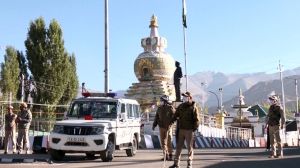Prime Minister in pin-stripes
Critics of Pakistan’s establishment are dismissing the elevation of Shaukat Aziz to the office of Pakistan’s Prime Minister as ano...

Critics of Pakistan’s establishment are dismissing the elevation of Shaukat Aziz to the office of Pakistan’s Prime Minister as another turn of the country’s political merry-go-around. The government, on the other hand, claims that Aziz will provide the leadership alternative that Pakistan’s traditional politicians have so far failed to provide. Neither statement sums up the complex realities that face Pakistan and its new PM. Aziz must prove himself to be more than an economic manager and public relations man if he is to meet the challenges he has embraced by accepting his new position.
General Pervez Musharraf and his military junta have put Aziz into office as a manager, not as a political leader. But the job of PM requires political skills more than the impressive credentials of Aziz as banker and as Pakistan’s Finance Minister for the last five years. Aziz’s performance as Finance Minister depended partly on international factors such as rescheduled debt, increased remittances and generous foreign assistance. A competent economic team, in the Finance Ministry as well as at the State Bank and the Commerce Ministry, also helped him. It would be unfair not to give credit for macro-economic reform to the State Bank Governor, Ishrat Hussain, and for some expansion in Pakistani exports to Razzak Dawood, who served as Commerce Minister immediately after Musharraf’s assumption of power in 1999. But macro-economic management is only one part of running a country.
As PM, Aziz must demonstrate his abilities as a consensus builder and constituency manager. In these spheres his competence has yet to be tested. Even in the economic sphere, Aziz has to prove that he cares for people as much as he does for the government’s balance sheet. The fruit of Pakistan’s economic recovery over the last five years has yet to reach the common Pakistani, who still stares at poverty, ignorance, disease and unemployment. It is one thing to get debt rescheduled, secure loans from IFIs, and stabilise government finances with inflows of foreign funds. It is a much bigger challenge to ensure education, healthcare and jobs for the citizens of Pakistan.
What can Aziz do to make the transition from finance manager of Pakistan, and that too at the balance sheet level, to a national leader? He could follow in the footsteps of Turkey’s PM Turgat Ozal, who came to office under somewhat similar circumstances in 1983. Ozal was an economic manager under military ruler General Kenan Evren, who took power in a coup d’etat in 1980. General Evren held parliamentary elections in 1983, after disqualifying all major political figures of the pre-1980 era. Ozal formed the Motherland Party (known by its Turkish acronym ANAP) and won the election against Ataturk’s party, the Republican People’s Party (CHP) and the army’s favourite, the Nationalist Action Party (MHP).
Ozal became PM with Evren’s blessings but carefully distanced himself from the military ruler. He gradually allowed the disqualified politicians to return to politics, thereby healing Turkey’s divisions. Evren, too, helped Ozal by sticking to his promise of serving one term as President and retiring honourably at its end in 1989. In the ensuing presidential election, Ozal succeeded Evren as President, thereby ensuring continuity in the new system. By 1991, Suleyman Demirel, the popular politician most hated by the military, had been allowed to re-enter politics and had won election as PM. When Ozal died in office in 1993, Demirel became Turkey’s ninth president.
Beginning as an economic manager, Ozal had transformed himself into a bridge between civilian Turkey and the country’s powerful military. In the process, by encouraging the military to withdraw its veto on traditional politics while serving as a political figure in the interregnum, he helped Turkey manage a successful transition from military to civilian rule. Turkey now has a self-sustaining political system. The old politicians banned by the military eventually all returned to politics and some of them became PMs. But Turkey also got a new generation of politicians, which is now running the show.
The lesson Aziz and Musharraf can learn from that phase in Turkey is to recognise that they cannot bring Pakistan together by indefinitely keeping popular politicians out of the political arena. At some point the persecution for ‘‘past mistakes’’ must come to an end and the healing process must begin. Of course, Ozal had advantages that Aziz does not have. His rise to office was through an election process untainted by administrative shenanigans.
But if Aziz rises above the pettiness of polarisation, gradually removes all tainted figures (including the Chief Election Commissioner who secured his election) and reaches out to the traditional politicians, he would soon find a broader range of political allies than those assembled for him by the intelligence services. The Opposition, too, would probably forgive him his dubious legitimacy and help pave the way for a step-by-step transition to a self-sustaining political system. Of course, Musharraf would have to help Aziz by fixing a timeline for when he will ride into the sunset, something that is not the tradition of Pakistan’s military rulers.
Apart from following the Turgat Ozal route in domestic politics, Aziz should also focus on two of his greatest challenges: the war against terrorism and widening economic success beyond the government’s balance-sheet. Pakistan cannot afford to see the war against terrorism as an American war. Terrorism threatens Pakistan and must be eliminated for Pakistan’s sake. To win the war against terrorism, Aziz should persuade his military mentors to stop making distinctions between and among terrorists. Pakistan must eliminate or disarm all sectarian, religio-political and ethnic terrorist groups.
The resources of law enforcement should be dedicated to the anti-terrorist effort. To do so, the government must end all ‘‘law enforcement’’ distractions, such as accountability and political witch-hunts. Every law enforcement official involved in chasing after politicians and errant civil servants is a soldier less in the war against terrorists. Why must Pakistan wastefully deploy police officials to keep domestic political opponents such as Asif Zardari and Javed Hashmi in prison? Surely these men in uniform can play a role in keeping terrorists in check. Similarly, why must a large contingent of military ‘‘investigators’’ led by a Lieutenant General serve in the National Accountability Bureau at a time when the country needs officers with intelligence-gathering talents to hunt for foreign and homegrown terrorists?
Terrorism and political persecution also have an adverse impact on Pakistan’s economic prospects. Investment has not been one of the economic indicators that are said to have improved over the last five years. Investors, both domestic and foreign, remain reluctant to invest in a climate of physical insecurity caused by sporadic terrorist attacks and an environment of political insecurity resulting from frequent changes in the country’s laws. Investment does not come easily to a country where bombs go off every few days or where businessmen and foreign executives have been known to end up in prison for investing under a previous regime. Aziz must work towards developing a legal regime that relies on something more than the magician’s touch of legal wizards such as Sharifuddin Pirzada. Investors must feel safe from violence as well as a constantly changing legal system before they will start investing significantly in Pakistan.
In addition to healing Pakistan’s internal divisions, focusing on the war against terrorism and making investment genuinely secure, Aziz must also pay attention to Pakistan’s massive economic disparities and low social indicators. Linked to these is the task of normalising relations with India, which would free resources for the social sector and open an economically efficient regional market. Thirty-one per cent of Pakistanis live below the poverty line and another 24 per cent live barely above it. Pakistan’s social indicators are among the lowest in the region. If these people are to have a stake in Pakistan’s future, Aziz must show that Pakistan’s government has an interest in the future of its people.
The writer is a Visiting Scholar at the Carnegie Endowment for International Peace in Washington DC. He served as adviser to Pakistani Prime Ministers Nawaz Sharif and Benazir Bhutto and as Pakistan’s Ambassador to Sri Lanka



- 01
- 02
- 03
- 04
- 05




























